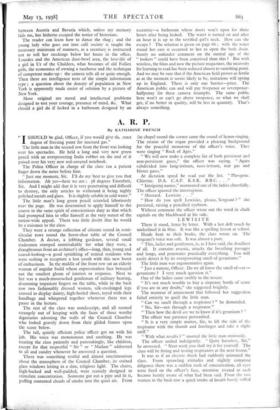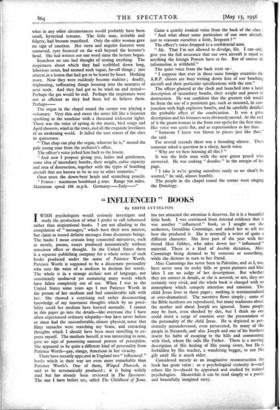A. R. P.
By KATHARINE FRENCH
" T SHOULD be glad, Officer, if you would give thy. exact 1 degree of freezing point for mustard gas."
The little man in the second row from the front was looking over his spectacles. He held a long and very new green pencil with an overpowering India rubber on the end of it poised over his very new red-covered notebook.
The Police Officer in charge of the class ran a patient finger down the notes before him.
" Just one moment, Sir. I'll do my best to give you that information. Ah yes—here we are ; 58 degrees Farenheit, Sir. And I might add that it is very penetrating and difficult to destroy, the only articles to withstand it being highly polished metals and glass. It is slightly soluble in cold water."
The little man's long green pencil scrawled laboriously over the page. He was determined to apply himself to the course in the same spirit of conscientious duty as that which had prompted him to offer himself at the very outset of the nation-wide appeal. There was little doubt that he would be a nuisance to the class.
They were a strange collection of citizens seated in semi- circular rows round the horse-shoe table of the Council Chamber. A doctor, a jobbing gardener, several small tradesmen stamped unmistakably for what they were, a draughtsman from an architect's office—long, thin, young and scared-looking—a good sprinkling of retired residents who were seeking to recapture a lost youth with this new burst of enthusiasm. In the middle of the front row sat an elderly woman of angular build whose expressionless face betrayed not the smallest gleam of interest or response. Next to her was a much-moustached gentleman of military bearing, drumming impatient fingers on the table, while in the back row two fashionably dressed women, silk-stockinged legs crossed to display dainty, high-heeled shoes, toyed with their handbags and whispered together whenever there was a pause in the lecture.
The rest of the class was nondescript, and all seemed strangely out of keeping with the faces of those worthy dignitaries adorning the walls of the Council Chamber who looked gravely down from their gilded frames upon the scene below.
The tall, quietly efficient police officer got on with his job. His voice was monotonous and soothing. He was treating the class patiently and painstakingly, like children, except for that respectful " Sir " or " Madam " addressed to all and sundry whenever he answered a question.
There was something restful and almost sanctimonious about the atmosphere of the Council Chamber, its stained glass windows letting in a dim, religious lighi. The chairs, high-backed and well-padded, were scarcely designed to stimulate. concentration. Someone got out a pipe and lit it, puffing contented clouds of smoke into the quiet air. From the chapel round the corner came the sound of hymn-singing. The strains of the organ provided a pleasing background for the peaceful monotone of the officer's voice. They were singing " Rock of Ages."
" We will now make a complete list of both persistent and non-persistent gases," the officer was saying. " Again subdivided into lung-irritant, nose-irritant, tear gas and blister gases."
At dictation speed he read out the list. " Phosgene. Chlorine. D.A. C.A.P. K.S.K. B.B.C. . . ."
" Intriguing names," murmured one of the ladies cheerfully. The officer ignored the interruption.
" Mustard. Lewisite . . ."
" How do you spell Lewisite, please, Sergeant ? " she persisted, raising a pencilled eyebrow.
Without comment the officer wrote out the word in chalk capitals on the blackboard at his side.
LEWISITE There it stood, letter by letter. With a last deft touch he underlined it in blue. It was like a spelling lesson at school.
Heads bent to their books, the class wrote on. The sergeant's voice was soft. It was almost a purr.
" This, ladies and gentlemen, is, as I have said, the deadliest of all. It contains arsenic, attacks the breathing passages and lungs, and penetrates practically everything. You will easily detect it by its overpowering smell of geraniums."
The little man was argumentative again.
" Just a minute, Officer. Do we all know the smell of—er- geraniums ? I very much question it."
One of the ladies came swiftly to the rescue.
" It's not much trouble to buy a sixpenny bottle of scent if you are in any doubt," she suggested brightly.
The murmur of amusement that followed her suggestion failed entirely to quell the little man.
" Can we smell through a respirator ? " he demanded.
" No, Sir—not through a respirator."
" Then how the devil are we to know if it's geranium ? "
The officer was patience personified.
" It is a very simple matter, Sir, to lift the side of the respirator with the thumb and forefinger and take a slight sniff."
" With what results ? " snorted the little man anxiously.
The officer smiled indulgently. " Quite harmless, Sir," he answered. " Next week you shall try it for yourself. The class will be fitting and testing respirators at the next lesson."
It was as if an electric shock had suddenly animated the class. From sprawling attitudes and slightly comatose diligence there was a sudden rush of concentration, all eyes were fixed on the officer's face, attention riveted as each became keenly aware of what had been said. From the two women in the back row a quick intake of breath barely stifled what in any other circumstances would probably have been small, hysterical screams. The little man, irritable and fidgety, had become transfixed. Only the older woman gave no sign of emotion. Her stern and angular features were unmoved, eyes focussed on the wall beyond the lecturer's head. She had written not one word since the lecture began.
Somehow no one had thought of testing anything. The respirators about which they had scribbled down long, laborious notes, had seemed such vague, far-off things ; just objects in a lesson that had got to be learnt by heart. Nothing more. Now they were suddenly become realities ; deadly, frightening, suffocating things looming into the nearness of next week. And they had got to be tried on and tested— Perhaps the gas would be real. Perhaps the respirators were not as efficient as they had been led to believe them. Perhaps— The organ in the chapel round the corner was playing a voluntary. Very thin and sweet the notes fell like a fountain sparkling in the sunshine with a thousand iridescent lights. There was the voice of spring in the music, bird songs and April showers, wind in the trees, and all the exquisite loveliness of an awakening world. It lulled the taut senses of the class to quiescence.
" That chap can play the organ, whoever he is," mused the pale young man from the architect's office.
The officer's voice jerked him back to the lesson.
" And now I propose giving you, ladies and gentlemen, some idea of incendiary bombs, their weight, cubic capacity and area of destruction, together with the types of bombing aircraft that are known to be in use in other countries."
Once more the down-bent heads and scratching pencils. " France : maximum bombload 4 tons. Range boo miles. Maximum speed 186 m.p.h. Germany—Italy—" Came a quietly ironical voice from the back of the class : " And what about some particulars of our own aircraft, just to reassure ourselves a little, Sergeant ? "
The officer's voice dropped to a confidential note.
" Ah. That I'm not allowed to divulge, Sir. I can only give you the full assurance that our own aircraft is equal to anything the foreign Powers have so far. But of course all information is withheld."
The quiet voice from the back went on : " I suppose that over in those same foreign countries the A.R.P. classes are busy writing down lists of our bombing aircraft and their particular specifications with the rest."
The officer glanced at the clock and launched into a lurid description of incendiary bombs, their weight and power of destruction. He was confident that the greatest risk would be from the use of a persistent gas, such as mustard, in con- junction with high explosive bombs, and he carefully detailed the probable effect of the combination. It was a grim description and his listeners were obviously moved. At the end of it the gaunt woman in the front row spoke for the first time. Her voice was quite flat, and as expressionless as her face.
" Someone I knew was blown to pieces just like that," she said.
For several seconds there was a brooding silence. Then someone asked a question in a sharp, harsh voice.
" Why are we here learning all this ? "
It was the little man with the new green pencil who answered. He was making " doodles " in the margin of his page.
" I take it we're getting ourselves ready so we shan't be wanted," he said, almost humbly.
The people in the chapel round the corner were singing the Doxology.















































 Previous page
Previous page